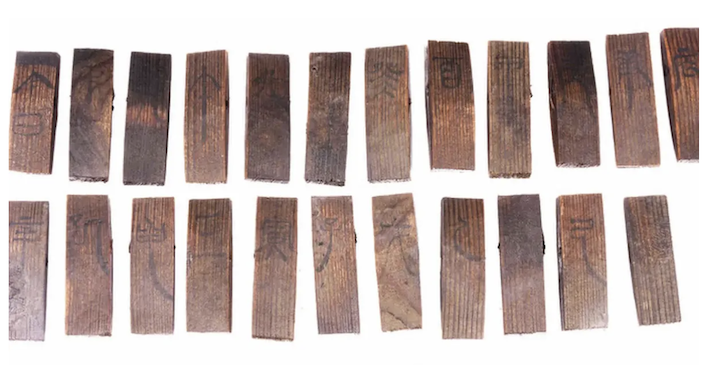 WULONG DISTRICT, CHINA—A set of 23 wooden slips has been found among the more than 600 artifacts recovered from a 2,000-year-old waterlogged wooden chamber tomb in southwestern China by researchers from the Chongqing Cultural Relics and Archaeology Research Institute, according to a Live Science report. Characters written on the wooden slips, which each measure about an inch wide and four inches long, suggest the set is related to the traditional Chinese astronomical calendar known as the Tiangan Dizhi, or “Ten Heavenly Stems and 12 Earthly Branches.” This system was established during the Shang Dynasty, between about 1600 and 1050 B.C. Perforations on the edges of each slip suggest that they had been tied together. It is not clear how the slips would have been used, but archaeologists think that slips such as these may have been used to represent particular years in a 60-year cycle. To read about other finds from Western Han Dynasty tombs, go to "Mirror, Mirror."
WULONG DISTRICT, CHINA—A set of 23 wooden slips has been found among the more than 600 artifacts recovered from a 2,000-year-old waterlogged wooden chamber tomb in southwestern China by researchers from the Chongqing Cultural Relics and Archaeology Research Institute, according to a Live Science report. Characters written on the wooden slips, which each measure about an inch wide and four inches long, suggest the set is related to the traditional Chinese astronomical calendar known as the Tiangan Dizhi, or “Ten Heavenly Stems and 12 Earthly Branches.” This system was established during the Shang Dynasty, between about 1600 and 1050 B.C. Perforations on the edges of each slip suggest that they had been tied together. It is not clear how the slips would have been used, but archaeologists think that slips such as these may have been used to represent particular years in a 60-year cycle. To read about other finds from Western Han Dynasty tombs, go to "Mirror, Mirror."
Update on Excavation of Intact Western Han Dynasty Tomb
